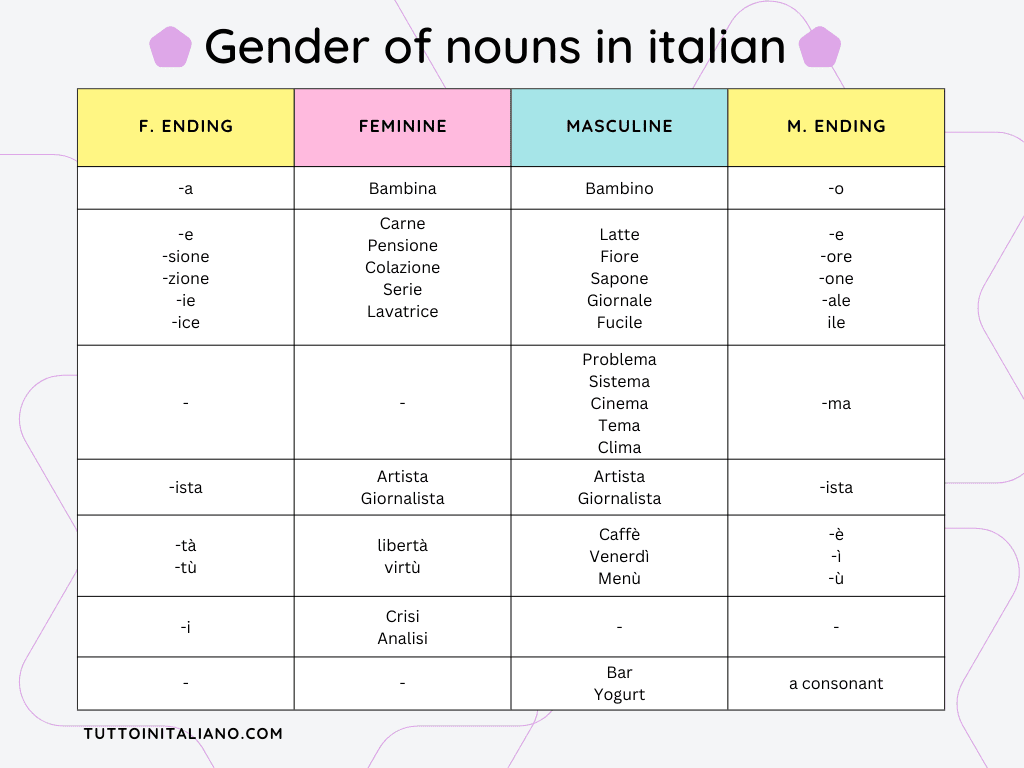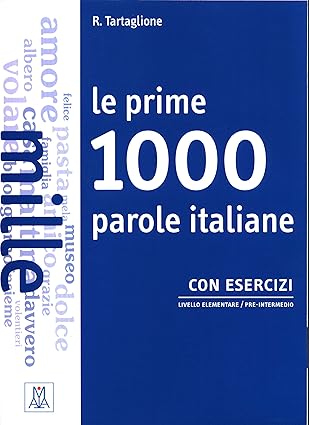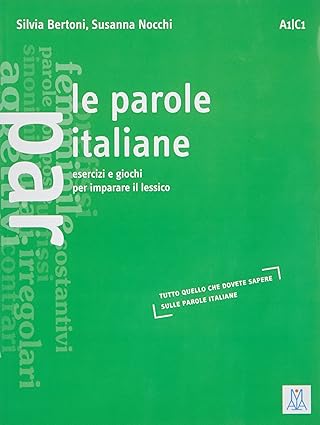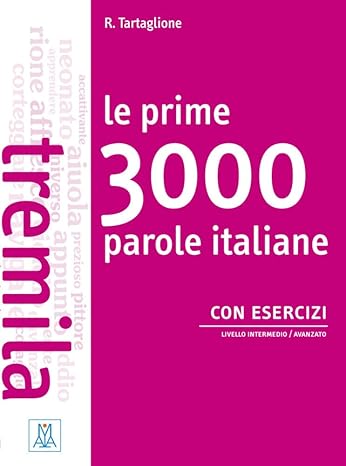1. How to tell if an Italian word is masculine or feminine?

Italian nouns can be either masculine or feminine. Italian masculine nouns usually end in -o and feminine Italian nouns end in -a
Masculine (maschile): Bambino(child), Ragazzo(boy), Libro(book), Giorno(day), Anno(year)
Feminine (femminile): Bambina(child), ragazza(girl), persona(person), parola(word), ora(Hour)
- La bambina si beve il latte.
- (The baby girl is drinking the milk)
- La ragazza si chiama Maria.
- (The Girl is called Maria)
- Maria è la persona più bella che ho mai conosciuto.
- (Maria is the most beautiful person I’ve ever met)
- Non vedo l’ora di vederti.
- (I can’t wait to see you)
2. How to tell if a word ending with (e) is masculine or feminine in Italian?
Italian nouns ending in -e can be feminine or masculine.
Masculine (maschile): Latte(milk), Ristorante(restaurant), Studente(student), Pane(bread)
- Il bravo studente beve il latte prima di andare alla scuola.
- (The good student drinks milk before going to school.)
- Nel ristorante mangio il pane con la minestra.
- (In the restaurant, I eat bread with soup)
Feminine (femminile): Classe(class), Carne(meat), Notte(night), Chiave(key)
- Non mangio la carne in notte.
- (I don’t eat meat at night.)
- Non posso trovare le chiave della classe.
- (I can’t find the class keys)
A. Italian nouns ending in -ore, -one, -ale, -ile are usually masculine.
Masculine (maschile): fiore(flower), sapone(soap), giornale(newspaper), fucile(gun).
- Il fiore è rosso.
- (The flower is red.)
- Nel bagno c’è il sapone.
- (In the bathroom there is soap)
- Non ho letto il giornale oggi.
- (I have not read the newspaper today)
B. Nouns ending in -sione or -zione are feminine.
Feminine (Femminile): televisione (Television), colazione(breakfast), pensione(pension)
- Guardo la televisione nella sala.
- (I watch the television in the living room)
- Reparo il colazione alla mattina.
- (I prepare breakfast in the morning)
- Ho prenotato una stanza in una pensione locale.
- (I booked a room at a local pension)
C. Italian nouns ending in -ie or -ice are feminine.
Feminine (femminile): serie(series), lavatrice(washing machine)
- Mi piace serie Italiana.
- (I like Italian series)
- La Lavatrice non funziona.
- (The washing machine does not work)
D. Nouns ending in -e and referring to a person are masculine when they indicate a man, and feminine when they indicate a woman.
| Feminine | Masculine |
| Maria è insegnante. (Maria is a teacher) | Gianni è insegnante. (Gianni is a teacher) |
3. What words end in (a) but are masculine in Italian?
Some masculine nouns end in -a like:
1) -a : Poeta(Poet), Pilota(Pilot)
- Il poeta scrive poesie in Italiano.
- (The Poet writes poems in Italian)
- Il pilota si guida l’aereo.
- (The Pilot drives the plan)
Poeta and pilota are also feminine (la poeta/la pilota)
2) -ma : Problema(problem), Tema(essay), Sistema(system), Cinema(cinema), Clima(climate), Programma(program)
- Hai un problema con me?
- (Do you have a problem with me?)
- Devi scrive un tema dopo la lezione!
- (You have to write an essay after class!)
- Il sistema non funziona.
- (The system is not working)
- Il clima è brutto oggio.
- (The weather is bad today)
4. Italian nouns ending in -ista and referring to people are masculine when they indicate a man, and feminine when they indicate a woman.
masculine/ feminine: artista(artist), dentista(dentist), giornalista(journalist)
| Feminine | Masculine |
| Maria è una brava artista. (Maria is a goog artist) | Gianni è un bravo giornalista. (Gianni is a good Journalist) |
Amazon ad
5. Some feminine Italian nouns that end in -o, some of them are abbreviations
Feminine (femminile): Mano(hand), auto(car), foto(photo), radio(Radio), moto(motorcycle).
- La foto = La fotografia
- (The photo = the photography)
- Ti scatto una foto.
- (I’ll take a picture of you)
- Spegni la radio!
- (Turn off the radio!)
- Guido una moto vecchia.
- (I drive an old motorcycle)
6. Italian nouns ending in -tà and in -tù are feminine, and are invariable.
Feminine (femminile): libertà(liberty), gioventù(youth), città(city), età(age), virtù(vitue)
- La statua di libertà.
- (The statue of liberty)
- In quale città vivi?
- (Which city do you live in?)
7. Italian nouns ending in -è, -ì, and -ù are masculine, and they are invariable.
masculine (maschile): caffè(coffee), tè(tea), venerdì(friday), menù(menu)
- Bevi il tè o il caffè alla mattina?
- (Do you drink tea or coffee in the morning?)
- Andrò al ristorante al venerdì prossimo, e ordinerò cose belle dal menù.
- (I will go to the restaurant next Friday, and I will order nice things from the menu)
8. Italian nouns ending in -i are feminine and are invariable.
Feminine (Femminile): crisi(crisis), analisi(analysis), sintesi(synthesis)
- La gente dice che la crisi è passata.
- (People say the crisis is over)
- L’analisi è corretta.
- (The analysis is correct.)
9. What is the correct gender of most nouns ending in a consonant in Italian?
Nouns ending in a consonant are Masculine, especially words of foreign origin, and are invariable:
Masculine (machine): bar, sport, yogurt, computer
- Vado al bar con i miei amici.
- (I go to the bar with my friends.)
- lo sport è importante.
- (Sport is important.)
- Uso sempre il computer quando lavoro.
- (I always use the computer when I work.)
10. Specific rules for masculine and feminine Italian nouns.
A). The names of continents, states, regions, cities, and islands are usually feminine, but many states have masculine names.
| Feminine | Masculine | |
| States Continents Cities Islands | l’Italia la Francia La Germania L’Europa L’America Milano Torino Venezia la sicilia La Sardegna | il Belgo il Canada l’Egitto il Cairo il Borneo |
B). The names of the mountains, lakes, rivers, oceans, and seas are usually masculine. but some of them are feminine
| masculine | feminine | |
| mountains lakes seas oceans | Gli Appennini Il Monte Bianco Il Garda L’Adriatico Il Pacifico | Le Alpi Le Dolomiti La Senna |
C). The names of the months and days of the week are masculine, except for Sunday (La Domenica)
| Months of the year | Days of the week |
| Il gennaio(january) Il febbraio(february) Il marzo(March) L’aprile(April) Il maggio(May) Il giugno(June) Il luglio(july) l’agosto(August) Il settembre(september) l’ottobre(october) Il novembre(November) Il dicembre(Dicember) | Il Luedì(Monday) Il Martedì(Tuesday) Il Mercoledì(Wednesday) Il Giovedì(thursday) Il Venerdì(Friday) Il Sabato(Saturday) |
D). Cardinal points, languages, colors, metals, and chemical elements are masculine.
| Cardinal Points | Languages | Colors | Metals and chemical elements |
| Il nord(the north) Il sud(the south) L’est(the east) L’ovest(the west) Il meridione (the south) Il ponente(the west) | L’italiano(italian) Il francese(french) Lo spagnolo(spanish) | Il bianco(white) Il rosso(red) Il verde(green) | L’oro(gold) Il ferro(iron) Il carbone(coal) L’ossigeno(oxygen) L’ottone(Brass) L’uranio(Uranium) |
Exercises on the gender of nouns – Italian A1 Grammar
A). Categorize the following words into masculine and feminine
Mano, gioventù, pensione, ragazzo, poeta, classe, bambina, domenica, giorno, bar, latte, cinema, crisi, parola, ristorante, problema, pane, menù, chiave, fiore, carne, colazione, serie, pilota dentista, radio, giovedì.
The answer
Mano(f), gioventù(f), pensione(f), ragazzo(m), poeta(m/f), classe(f), bambina(f), domenica(f), giorno(m), bar(m), latte(m), cinema(m), crisi(f), parola(f), ristorante(m), problema(m), pane(m), menù(m), chiave(f), fiore(m), carne(f), colazione(f), serie(f), pilota(m/f), dentista(f/m), radio(m), giovedì(m).
B). Which of the following words is not masculine
Canada, tema, garda, analisi, Appennini, auto, aprile, mercoledì, età.
The answer
analisi, auto, età.


